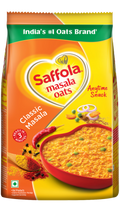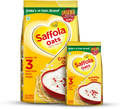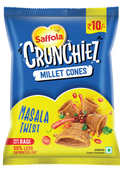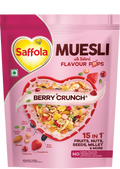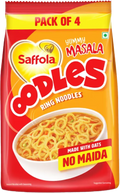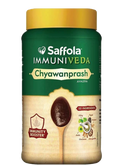29 June, 2024

5 min

16

Our heart is one of the most vital organs in the body, and it needs essential nutrients to function to maintain its optimal potential. These nutrients are vital compounds and are to be obtained through our food. They play a crucial role in supporting various bodily functions, including key roles for the heart. In this blog, we will delve into what essential nutrients are, why they are necessary for your body and some of the essential nutrients that are beneficial for your heart health. Read on to be informed!
What do you mean by essential nutrients?
So, essential nutrients are substances that our body needs but cannot produce on its own, that is it is received from the diet including natural foods or supplements. Our body requires a wide range of essential nutrients, which include vitamins, minerals, protein, carbohydrates, fats, and water, to function correctly. It is advisable to consult with your healthcare professional or a nutritionist to understand the importance of these essential nutrients and the individual recommended amounts.
Why are essential nutrients important for your heart health?
Maintaining a healthy heart is essential for your overall well-being, and consuming nutrients adequately is critical to achieving this. Essential nutrients provide the necessary building blocks to maintain a strong and efficient cardiovascular system. They help regulate blood pressure, support circulation, help reduce inflammation and oxidative stress—all of which contribute to better heart health. Diet and nutrition play a significant role in maintaining heart health. A balanced diet comprises nutrients and food as a whole and does not rely on a single nutrient group. For example, fibre, micronutrients, and omega-3 fatty acids are some essential nutrients that can help nourish your heart and aid good health. (source)

List of 7 essential nutrients that support heart health:
Here’s a list of essential nutrients to guide you through your heart health journey:
- Omega-3 Fatty Acids: A type of polyunsaturated fat, omega-3 is found in fatty fish, such as salmon, mackerel, and sardines. Some plant-based sources of omega-3 are walnuts, flaxseeds, chia seeds, soybean, kidney beans and spinach. Omega 3 plays a role in the heart, blood vessels, and immune system. It is known as being a brain food which can help reduce inflammation, lower triglyceride levels and help maintain healthy heart rhythms.
- Fibre: Found in whole grains, fruits, vegetables, and legumes, fibre is an essential nutrient for heart health. It not only helps lower cholesterol levels but also regulates blood sugar control, which can be better for heart health. Moreover, incorporating fibre-rich foods into your diet supports healthy digestion and helps manage weight ICMR-NIN recommends the consumption of 30g/day of fibre for overall health. (source)
- Potassium: Bananas, oranges, tomatoes, leafy greens and coconut water are excellent sources of potassium. This mineral plays a crucial role in maintaining healthy blood pressure levels, supporting heart muscle contraction, and balancing electrolyte levels. Including potassium-rich foods in your diet can contribute to a healthier heart.
- Calcium: Calcium is not only important for strong bones and teeth but also plays a role in maintaining a regular heartbeat and healthy blood vessels. Dairy products including milk, cheese, yoghurt, curd, and paneer are good sources of calcium. Ragi is a non-dairy source of calcium. Ensuring an adequate intake of calcium contributes to a well-rounded diet. (source)
- Magnesium: Found in leafy greens, nuts, seeds, and whole grains, magnesium is vital for maintaining heart rhythm, regulating blood pressure, and supporting overall heart health. Including magnesium-rich foods in your diet can help with proper muscle and nerve function. (source)
- Iron: It is an essential mineral that plays a crucial role in maintaining heart health. One of its key functions is to support the production of red blood cells, which transport oxygen throughout the body. Sufficient oxygen supply is essential for the heart's functioning. Iron can be found in animal products such as lean meats and poultry. The plant-based sources like beans, lentils, fortified cereals, and spinach, can also contribute to your iron intake.
- Zinc: An essential nutrient, it supports heart health through various mechanisms. Zinc is crucial for immune system function, and a healthy immune system indirectly contributes to overall cardiovascular well-being. To include zinc in your diet, you can consume seafood, particularly shellfish, poultry, lean meats, and dairy products. For those following a plant-based diet, legumes like chickpeas, beans, soybeans and lentils, as well as nuts and whole grains, can be a valuable addition to your zinc consumption.
Consuming these essential nutrients into your diet is crucial for overall health and supporting heart health. It is important to note that maintaining a balanced diet is essential. Additionally, it is advisable to limit the intake of processed and high-fat foods, as well as saturated and trans fats, added sugars, and sodium, as they can increase the risk of heart disease.
Nourish Your Heart for a Healthier Future
In conclusion, by prioritising diet and nutrition, you can nourish your heart and promote long-term cardiovascular health. A balanced diet that includes a variety of nutrient-rich foods is key to ensuring you provide your heart with the support it needs. If you are looking for a good balance of MUFA and PUFA in your cooking oil, look no further, Saffola Gold is packed with natural antioxidants and can be a good choice for cooking as well as vinaigrettes and tadkas. Including a variety of antioxidant-rich foods in your diet can provide heart-protective benefits. Remember, a healthy heart is the foundation of a vibrant life, so make conscious choices to fuel your body with these essential nutrients. Your heart will thank you for it, and you'll enjoy the benefits of improved overall well-being and vitality.



